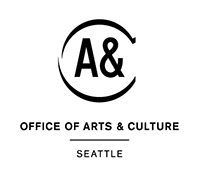With a Handkerchief and Bottlecaps, Uncle John Keeps an Ancient Hawaiian Game Alive
When we met Uncle John Kaohelauli'i on Oct. 11 at Marination in Columbia City, he carried a handkerchief, the same one he takes everywhere he goes. On it, black and white circles, which act as the playing board of an ancient game, can reveal lessons his ancestors knew by heart.
The game is Kōnane, and though it may look like checkers, it's nothing like it. Traditionally, the white pieces are coral from the ocean. The black ones represent volcanic rock from the mountains. Together, they show how Hawaiians thought about their world.
"Checkers is a very aggressive game. It's about consumption," Uncle John said during an afternoon training session. "Kōnane is the opposite: It's the Hawaiian way of thinking. In Kōnane, you have consumption, but you have to manage that consumption for long-term sustainability. So it is a totally different way of thinking."
He didn't sugarcoat why so few people still know the game. "Unfortunately for Hawaiians, we are victims of colonization. When you try to colonize the people, you try to erase them from who they are. That's the goal."
The proof is in the numbers. At a Hawaiian convention in Tacoma, packed with Native Hawaiians, Uncle John figured maybe 20% had even heard of Kōnane. Only half of those could actually play. And just a handful knew the real tactics. "So there's so much we don't know," he said.
But he keeps teaching anyway. It's his kuleana, his responsibility. "My kuleana is to teach as many Hawaiians as I can how to play the game. So that's my kuleana. So that kind of drives me." To sustain himself, Uncle John sells a handkerchief playing cloth, similar to the one he carries, through his website, where he also provides instructions for play.
Everything about Kōnane, which can be played on a grid of any size, reflects how Hawaiians see the world. "When you grow up in Hawaiʻi, there are two values. Never turn your back to the ocean, take only what you need." Grab too many pieces, and you lose. Take only what serves you, and you might win.
The board itself tells a story. "It's intermingled. It's not this side versus that," Uncle John points out. "For the Hawaiians, it's like, we are not going to survive if we are working against each other, we will survive as a people if we work together."
Uncle John is not trying to fill stadiums or get famous. "I decided that I wanted to teach. It was more important than winning." What he really wants is to walk through a park someday and see strangers playing Kōnane the way people play chess in Central Park. Then at least one piece of indigenous Hawaiian culture would stay alive.
This article is published under a Seattle Human Services Department grant, “Resilience Amidst Hate,” in response to anti-Asian American, Native Hawaiian, and Pacific Islander violence.
The Emerald's arts coverage is supported in part with funding from 4 Culture and the City of Seattle's Office of Arts & Culture. The Emerald maintains editorial control over its coverage.
Help keep BIPOC-led, community-powered journalism free — become a Rainmaker today.

